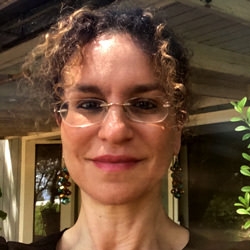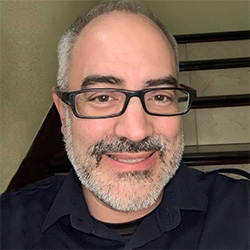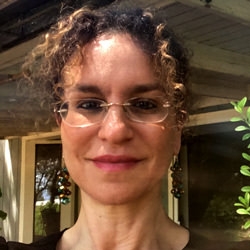
Search Results: domination
-
Join Aya Caspi, a Certified NVC Trainer, as she delves into the difficult topic of parenting, childhood trauma, and social status. She discusses the generational impact of being labeled by society as "less than" or subservient. The wounds of childhood trauma can be healed so they no longer are a means of control by a dominant culture.
-
How can we create a partnership and eye-level dialog with people who we perceive to have more power? In this session, we will create a practice of humanizing ourselves and others through empathy, practicing scary honesty, and making requests that serve both persons’ needs
-
-
Inbal speaks to a group about our habit of demanding something of our children but making it sound like a request, the components of a true request and the importance of being honest when making a demand.
-
-
-
-
We can't alone (nor with lone communities) transform the hidden structures of violence and domination. Dialogue alone isn't disruptive enough. We can easily be in dialogue with Trump supporters while the planet burns up, millions are still hungry, and we go extinct. NVC seriously risks reinforcing vast inequities and abuses if we're not radically engaging systemic constraints, and impacts of our choices that go beyond our immediate circle. Read on for ways to leverage NVC practices to expand true social change.
-
Untethering from dominant culture and internalized oppression takes releasing attachments and persistence inspite upheavals -- all with insufficient support. Even in community building we can bring oppression into our efforts to untether. The more we walk towards vision, the more tethers of patriarchy we undo, the more the cost. By exacting such high cost, patriarchal societies reproduce and sustain themselves. To untether we need fortitude.
-
In Nonviolent Communication "power over" refers to the use of power to dominate or control others. It is a form of violence or force, whether physical, emotional, psychological or otherwise. This learning tool has six lists, each containing different types of power over strategies: physical, sexual, intimidation, economic, emotional, isolation.
-
The notion of "micro-aggressions" may be levied by those in the dominant class - for example white folks may talk about receiving micro-aggressions when a (legitimately) angry BIPOC references them as "white". This shuts down the conversation and feeds a myth that everyone's pain about race is equal. It doesn't foster dialogue that moves us towards a more equitable, compassionate world. Read on for more about the complexity.
-
Control may help us feel safe in an unpredictable, unsafe, wild world. Wanting control may be a response to shielding ourselves from feeling fear and being aware of our vulnerability. The more we insulate from fear, discomfort, and vulnerability, the more we are cut off from aliveness; we can become more anxious, and depressed. The more we control the more we are disconnected from empathy and care. With aliveness come joy, peace, love, awe.
-

What will it take to reclaim our fundamental relatedness with all things alive, surrender our attempts to control nature, and find a way of living that averts or mitigates the worst possible catastrophes awaiting us while it's still possible?
-
The “mind” or our “ego” are often depicted as a static entity, an unchangable part of human nature, and as obstacles or negative parts of ourselves to overcome. This view creates maligning, a split within us, while remaining invisibly part and parcel of authority-based societies --the dominant culture and institutions into which we are born. Instead, I want to advocate an integration of reason and emotion, mind and heart, plus self and others.
-
Read here about patriarchy as a system, its impact on men and women, how its rooted in separation and control, leading to dominance and submission. Under patriarchy, even men are brutalized. Instead, we can embrace nonviolence to challenge patriarchy and its offspring (eg. capitalism, child trafficking, etc). And to make a lifelong commitment to undo socialization, act within our influence, and work towards liberation of all.
-
Even groups and organizations with noblest visions can slide into cult-like swamps. The reasons that bring people together are irrelevant; whether it's politics, spirituality, activism, art… a hidden hierarchy, plus dominance and submission dynamic can sprout, and beliefs that “we, our leader, and our path is better than others, we have all the answers”. As a member it can be hard to see. Here are signs of cult mentality and ways to assess.
-
Aya Caspi, a Certified NVC Trainer discusses how the "story" we tell ourselves about human nature impacts our childhood and the roles we are taught to play in society.
-
Perhaps human violence persists because we believe that violence is inevitable and there's nothing we can do about it -— even though there is notable evidence that this is likely not true. Read on for some research and theory on how cultures evolve to be collaborative or violent. Plus, learn benefits of collaboration and downsides to force, punishment, and control. These provide implications for how we might move towards a culture of more peace.
-
Society gives us short-sighted explanations about human nature, life and what’s (un)changeable. The coronavirus pandemic is disrupting that explanation. Our current social order upholds impoverishment, police brutality, and is leading us towards our extinction. Change begins with people mobilizing resources towards a vision that holds systemic care for all, plus engages shared risk and collective action towards that vision.
-
The pandemic has unsettled deep patterns of consumption. There’s a fear, and with it comes the mindset that is the heart of rampant consumption; habits which are essential to the market economy’s “economic recovery”. High consumption is also the most direct cause of environmental degradation. What do we need in order to significantly reduce consumption for our greater resilience and freedom, and to increase our planetary and human sustainability?












